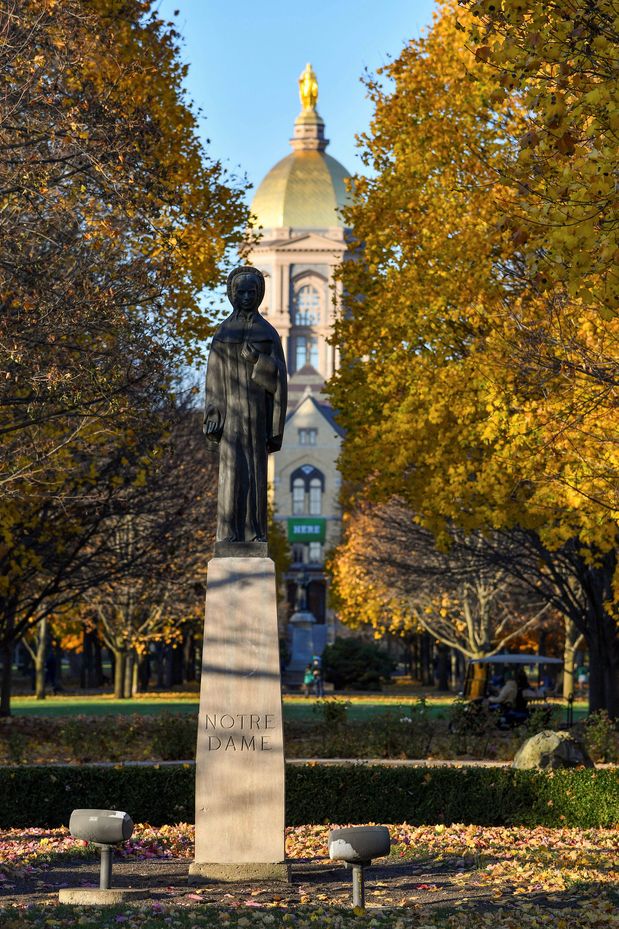
Harvard isn’t the only university facing a threat to its tax-exempt status over its compliance with civil rights laws.
Indiana Attorney General Todd Rokita has opened an investigation into diversity, equity and inclusion policies at the University of Notre Dame, warning that the institution may have run afoul of state law by promoting race-based goals in its latest 10-year plan.
Mr. Rokita said Thursday that the Catholic university’s DEI policies and practices “potentially violate federal and state civil rights laws and the terms of the university’s nonprofit status.”
“Indiana will not tolerate racial discrimination in education under the guise of DEI,” Mr. Rokita, a Republican, said in a statement. “Fairness demands that every individual be judged on their merits, not the color of their skin. Notre Dame’s DEI policies raise troubling questions about whether, in its pursuit of DEI goals, the university may be crossing the clear line that Indiana law draws against racial discrimination. I am seeking answers.”
Notre Dame, one of the nation’s best-known universities, denied any unlawful discriminatory conduct.
“Notre Dame is a premier Catholic research university, and as such, seeks to serve and reflect the broader Catholic Church, which is the world’s most global, multicultural, and multilingual institution,” the university said Thursday in a statement. “We do not engage in unlawful discrimination in our hiring or admissions processes and look to attract the best and brightest to our campus.”
The inquiry comes with President Trump targeting Harvard’s tax exemption as the administration investigates the university’s adherence to federal civil rights laws. Only the Internal Revenue Service may revoke federal nonprofit status.
At the heart of the Indiana probe is “Notre Dame 2033: A Strategic Framework,” a road map for the next decade that includes expanding the diversity of the university’s undergraduate and graduate student populations, as well as its faculty.
“Efforts to diversify the faculty and senior staff have proceeded in fits and starts, with modest successes — notably among Latino faculty — but also continued and significant challenges,” said the 2023 document. “Undergraduate students from underrepresented groups routinely attend classes for four years at Notre Dame without enrolling in a course taught by someone who looks like them.”
The university also said the Supreme Court’s 2023 decision in Students for Fair Admissions v. Harvard, which found race-based admissions policies unconstitutional, “will complicate, but not deter, our efforts to enroll a student body that reflects the diversity of experiences and gifts of the human family.”
In his letter to Notre Dame President Rev. Robert Dowd, Mr. Rokita said that the high court’s decision “marked a watershed moment in the advancement of civil rights in this country by making perfectly clear that no form of racial discrimination can be licensed in our higher education system.
“Yet it seems the University of Notre Dame may have met that moment and the Court’s decision with evasion, circumvention, and obstruction, rather than a good faith desire to respect the civil rights of students and faculty,” he said in the May 9 letter.
Mr. Rokita also cited the Supreme Court’s 1983 decision in Bob Jones University v. United States, which found that the federal government may revoke the tax-exempt status of universities, including religious institutions, for engaging in racial discrimination.
“Thus, virtually all forms of racial discrimination — even those employed in service of the interests of diversity, equity, and inclusion — are unlawful,” said Mr. Rokita. “Likewise, discriminatory practices perpetuated ’for whatever reasons,’ and even with good intentions, still jeopardize and are inconsistent with a university’s nonprofit status.”
He asked the university to provide by June 9 communications related to race-based criteria in its hiring and admissions, as well as information about its “multicultural recognition ceremonies” for graduation.












